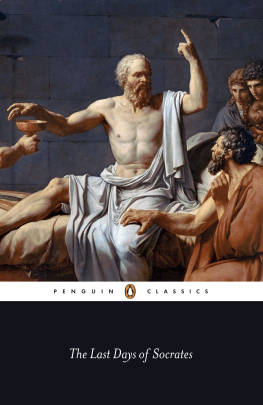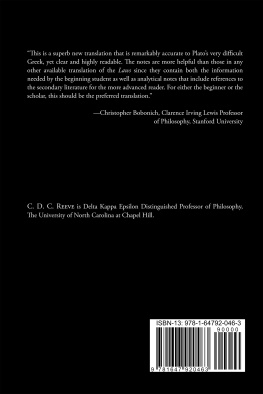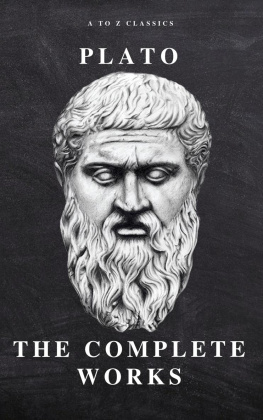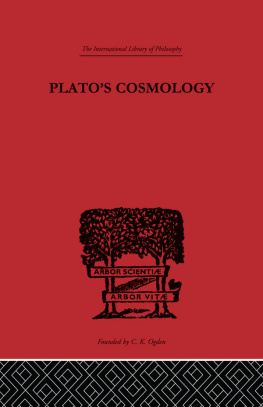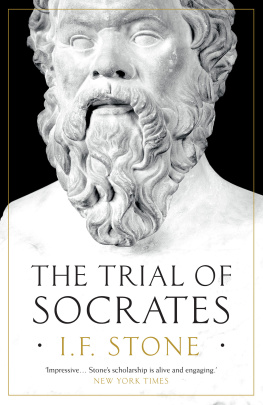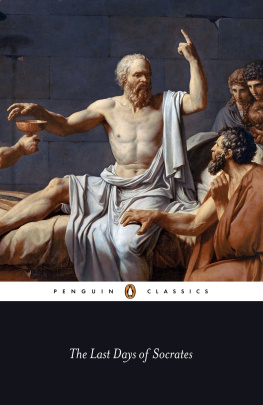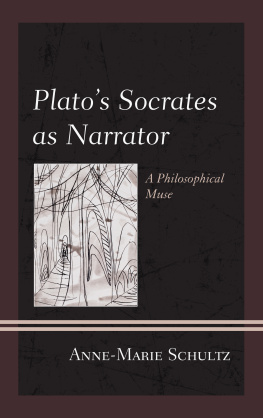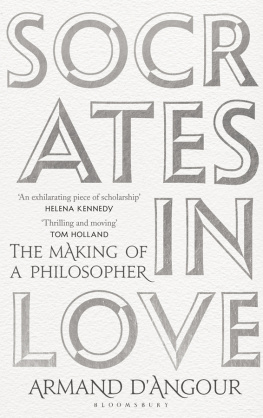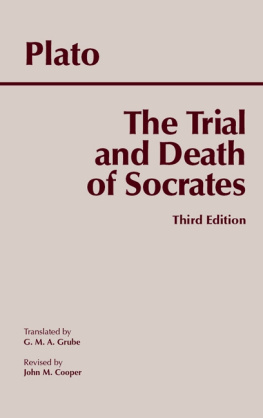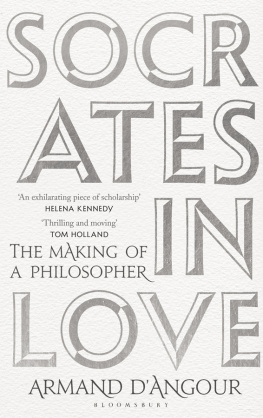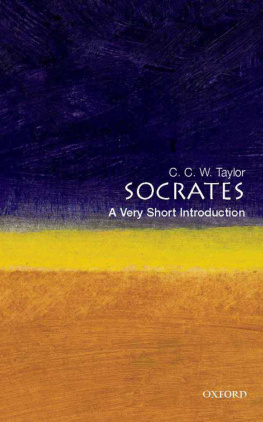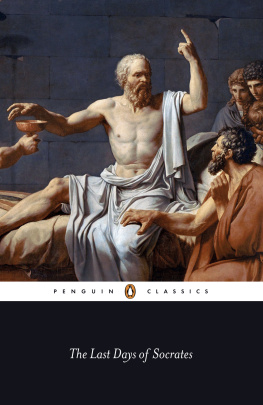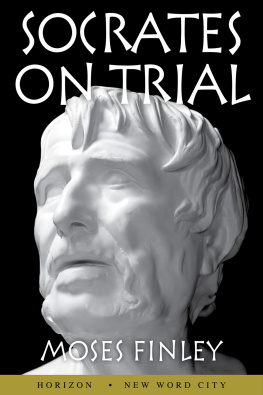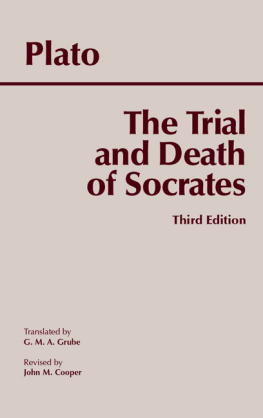Plato - The Last Days of Socrates
Here you can read online Plato - The Last Days of Socrates full text of the book (entire story) in english for free. Download pdf and epub, get meaning, cover and reviews about this ebook. year: 2013, publisher: CreateSpace Independent Publishing Platform, genre: Religion. Description of the work, (preface) as well as reviews are available. Best literature library LitArk.com created for fans of good reading and offers a wide selection of genres:
Romance novel
Science fiction
Adventure
Detective
Science
History
Home and family
Prose
Art
Politics
Computer
Non-fiction
Religion
Business
Children
Humor
Choose a favorite category and find really read worthwhile books. Enjoy immersion in the world of imagination, feel the emotions of the characters or learn something new for yourself, make an fascinating discovery.
- Book:The Last Days of Socrates
- Author:
- Publisher:CreateSpace Independent Publishing Platform
- Genre:
- Year:2013
- Rating:4 / 5
- Favourites:Add to favourites
- Your mark:
- 80
- 1
- 2
- 3
- 4
- 5
The Last Days of Socrates: summary, description and annotation
We offer to read an annotation, description, summary or preface (depends on what the author of the book "The Last Days of Socrates" wrote himself). If you haven't found the necessary information about the book — write in the comments, we will try to find it.
Plato: author's other books
Who wrote The Last Days of Socrates? Find out the surname, the name of the author of the book and a list of all author's works by series.
The Last Days of Socrates — read online for free the complete book (whole text) full work
Below is the text of the book, divided by pages. System saving the place of the last page read, allows you to conveniently read the book "The Last Days of Socrates" online for free, without having to search again every time where you left off. Put a bookmark, and you can go to the page where you finished reading at any time.
Font size:
Interval:
Bookmark:
PENGUIN  CLASSICS
CLASSICS
THE LAST DAYS OF SOCRATES
PLATO (c. 424347 BCE) stands, with his teacher Socrates and his pupil Aristotle, as one of the shapers of the whole intellectual tradition of the West. He came from a family that had long played a prominent part in Athenian politics, and it would have been natural for him to follow the same course; the reason for his not doing so, according to the seventh of the collection of letters attributed to him (all of them almost certainly inauthentic), was his disillusionment with the kind of politics that could lead, among other things, to the execution in 399 of Socrates. Rather less plausibly, the same letter suggests that Platos several visits to the court of Dionysius II, tyrant of Syracuse in Sicily, were motivated by a desire to put his political theories as developed above all in the master-work, Republic into practice. The reform of society, on an ethical basis, certainly remained one of his central theoretical concerns. However, the focus of his thinking was on ethics itself, combined with a distinctive metaphysics and an equally distinctive view of the nature of the physical world. In the mid-380s, in Athens, he founded the Academy, the first permanent institution devoted to philosophical research and teaching.
Plato wrote over twenty philosophical dialogues, appearing in none himself (most of them have Socrates as chief speaker). His activity as a writer seems to have lasted over half a century; few authors in any language could claim to rival his peculiar combination of brilliant artistry and intellectual power.
CHRISTOPHER ROWE was until 2009 Professor of Greek in Durham University, where he moved in 1995 from the H. O. Wills Chair of Greek in the University of Bristol. His publications include The Cambridge History of Greek and Roman Political Thought (edited with Malcolm Schofield, 2000), New Perspectives on Plato, Modern and Ancient (edited with Julia Annas, 2002), Platos Lysis (with Terry Penner, 2005), and Plato and the Art of Philosophical Writing (2007). In Sarah Broadie and Christopher Rowe, Aristotle, Nicomachean Ethics (2002), Sarah Broadies philosophical commentary is accompanied by Christopher Rowes translation. He has also translated, and/or written commentaries on Platos Phaedrus (1986), Phaedo (1993), Statesman (1995) and Symposium (1998); his translation of Phaedrus appeared in Penguin Classics in 2005. In the Queens Birthday Honours for 2009 he was made an OBE for services to scholarship.
I am grateful to Peter Carson for first proposing to me the project of a new version of The Last Days of Socrates, at a moment when the original version was past its fiftieth birthday and despite some significant revisions and improvements showing its age. In putting the volume together, I have enjoyed the support of a magnificent team of helpers, who have all been through the translations and notes, in some cases more than once, and saved me from a variety of infelicities and blunders. Martin Foulkes consented to read my material as someone with an educated interest in, but no great familiarity with, Plato. Debra Nails looked at earlier versions of the translations and notes especially from the point of view of someone who regularly teaches Plato to US students; I soon lost count of the places where she either helped me refine the English of the translations or saved me from embarrassment in the notes. I have gladly accepted many of her suggestions too many to be acknowledged individually. Finally, Heather Rowe has read and reread everything, rightly insisting on the removal of the worst idiosyncrasies in my English, and generally contributing a huge amount of time and effort towards helping put the whole into publishable form. The flaws that remain are mine alone.
Christopher Rowe
June 2009
Walter Burkert, Greek Religion (Cambridge, MA, 1985).
Paul Cartledge, Ancient Political Thought in Practice (Cambridge, 2009). (Includes some reflections on Socrates death.)
Kenneth Dover, Greek Popular Morality in the Time of Plato and Aristotle (Berkeley/Los Angeles, 1974).
Charles H. Kahn, Pythagoras and the Pythagoreans (Indianapolis/Cambridge, MA, 2001).
Robert Parker, Athenian Religion: A History (Oxford, 1998).
Christoph Riedweg, Pythagoras: His Life, Teaching and Influence, tr. S. Rendall (Ithaca, NY, 2002).
John Burnet, Platonis opera, vol. I (Oxford (Oxford Classical Texts), 1903).
E. A. Duke, W. F. Hicken, W. S. M. Nicoll, D. B. Robinson, J. C. G. Strachan, Platonis opera, vol. I (Oxford (Oxford Classical Texts), 1995). (The new Oxford text.)
John M. Cooper (ed.), Plato: Complete Works (Indianapolis/Cambridge, MA, 1997).
Julia Annas and Christopher Rowe (eds.), New Perspectives on Plato, Modern and Ancient (Cambridge, MA, 2002).
Ruby Blondell, The Play of Character in Platos Dialogues (Cambridge, 2002). (Thought-provoking on the general issue of the relationship between the philosophical and the literary and dramatic elements in the dialogues.)
Gail Fine (ed.), Plato I and II (Oxford, 1999). (A useful general collection of articles on Plato.)
Terence Irwin, Platos Ethics (Oxford, 1995). (A standard modern treatment of its subject.)
Charles H. Kahn, Plato and the Socratic Dialogue: The Philosophical Use of a Literary Form (Cambridge, 1996).
Mark McPherran, The Religion of Socrates (University Park, PA, 1996).
Debra Nails, The People of Plato (Indianapolis/Cambridge, MA, 2003). (A complete prosopography of the people who figure in Platos dialogues; indispensable.)
Andrea W. Nightingale, Genres in Dialogue: Plato and the Construct of Philosophy (Cambridge, 1995). (On the intersection between philosophy and literature in Plato.)
Catalin Partenie (ed.), Platos Myths (Cambridge, 2009).
Terry Penner, Socrates and the Early Dialogues, in Richard Kraut (ed.), The Cambridge Companion to Plato (Cambridge, 1992), pp. 12169. (A short account of the Socratic theory of desire and action; for a much longer and more complete account, see the following item.)
Terry Penner and Christopher Rowe, Platos Lysis (Cambridge, 2005).
Gerald A. Press, Who Speaks for Plato? (Lanham, MD, 2000).
C(hristopher) J. Rowe, Plato (2nd edition, London, 2003). (A basic introduction to Plato which acknowledges that he wrote dialogues.)
Christopher Rowe, Plato and the Art of Philosophical Writing (Cambridge, 2007). (Includes detailed analysis of the Apology and Phaedo, and places them in the larger context of Platos work.)
Gerasimos Santas, Goodness and Justice: Plato, Aristotle and the Moderns (Oxford, 2001).
Nicholas D. Smith and Thomas Brickhouse, Platos Socrates (Oxford, 1994).
I. F. Stone, The Trial of Socrates (Boston, 1987).
Thomas Szlezk, Reading Plato (London,1999). (A useful short introduction.)
C. C. W. Taylor, A Very Short Introduction to Socrates (Oxford, 2000). (Very short, but very useful.)
Gregory Vlastos, Socrates: Ironist and Moral Philosopher
Font size:
Interval:
Bookmark:
Similar books «The Last Days of Socrates»
Look at similar books to The Last Days of Socrates. We have selected literature similar in name and meaning in the hope of providing readers with more options to find new, interesting, not yet read works.
Discussion, reviews of the book The Last Days of Socrates and just readers' own opinions. Leave your comments, write what you think about the work, its meaning or the main characters. Specify what exactly you liked and what you didn't like, and why you think so.

